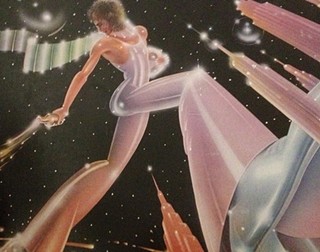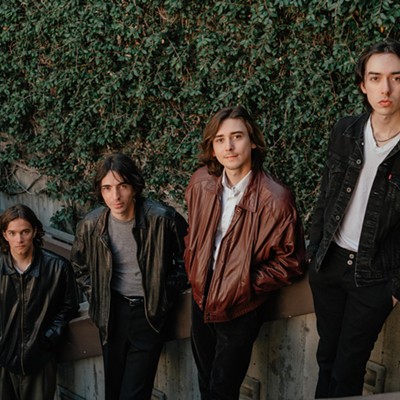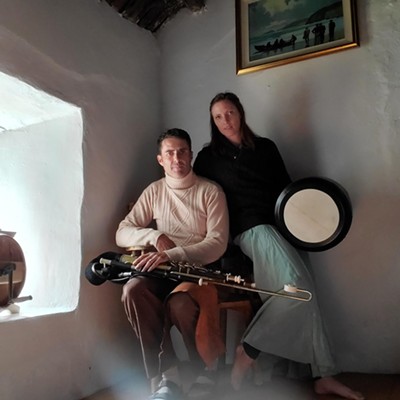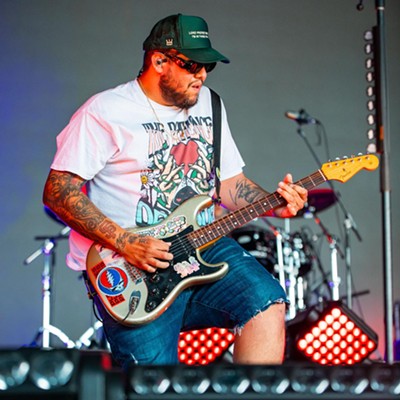After being unceremoniously fired from his job, a carpenter buys an arsenal of Mickey's 40s, downs most of them, and proceeds to urinate over everything, including golf balls, a dog and the Hollywood sign. In the background, screeching guitars blare and a guttural voice bellows "Cocaine runnin' 'round in my brain!"
The carpenter, however, is Parks and Recreation actor Nick Offerman (as Ron Swanson), and the musical accompaniment is provided by Los Angeles punk outfit FIDLAR.
When FIDLAR released their eponymous debut for Mom + Pop Music, I praised their "convergence of giddy irreverence with buzzing melody" in these very pages, but I also wrote critically about my fatigue with the kind of millennials' hedonism FIDLAR seemed to represent. After all, there isn't much distance between the acronym that comprises the band's name ("Fuck It Dog, Life's a Risk") and the utterly grating YOLO. But, whereas YOLO has become a battle cry for college students and young office drones who assume that a life without impulsive activities is effectively pointless, FIDLAR's ties to skate culture and punk rock provide an organic quality to their brash, reckless fun.
FIDLAR is also, in many ways, a legacy act. The band formed when the sons of T.S.O.L.'s keyboardist, Max and Elvis Kuehn (drums and guitar/vocals, respectively), connected with Brandon Schwartzel (bass) and his pal Zac Carper (vocals/guitar), who was working at—and sleeping in—famed producer Rob Schnapf's studio. As a group not-quite-literally born in the studio of the producer of Elliott Smith and Beck, and schooled in Southern California punk (from Circle Jerks to the Offspring), FIDLAR represent a studio creation of the purest order. Speaking by telephone from Los Angeles, Schwartzel talked about why FIDLAR came into existence.
"We were all pretty much friends, hanging out and partying together before it was like, 'We're going to be a band together.' It actually just naturally progressed into being a band," Schwartzel said. "We didn't really plan to do it, it was just, 'Oh, we got a show,' and then we got another show, and then we booked a show, and it just kept going from there."
As mundane as the group's origin story may sound, FIDLAR has been blazing a path since its inception. The group's first tour consisted of opening for the Hives. Their debut was recorded and released right into a maelstrom of publicity and praise. They have played throughout the world, from Europe to Australia to Japan, with acts like Wavves and Black Lips. All the jocularity and espoused ennui on FIDLAR—as on the breakneck punk of "Wake Bake Skate" ("And I'm so fucking cheap/ And I'm so fucking broke/ And I don't have a job/ And I don't have a home/ I don't have a life/ And I'm always stoned")—belies the group members' incredible motors.
"We're all just kind of workhorses, and it's just really fun to do," Schwartzel said. "We're all-day-creative and constantly trying to think of new stuff, and always wanting to record and always wanting to play. Once we all got together and started working together, then all this energy started just coming out."
FIDLAR oozes with young energy. Opener "Cheap Beer" presents rakish declarations housed under a mountain of feedback; "No Waves" is all needle-prick guitars and snotty indifference; "White on White" finds the group throttling their instruments before grinding them into dust; "5 to 9" manages to form a new punk anthem in approximately a minute. Suggesting miles of talent, the album is rude without lacking wit and spontaneous without abandoning melody. Of course, for a group formed in a studio, with a ferocious work ethic, recording is also a craft.
"It's all very collaborative. Some songs have happened just by us jamming, so we're like 'That's cool, let's record it right now.' It's not very thought out beforehand," Schwartzel said. "We kind of just start recording and work with it as it comes. We like using the studio as an instrument, in a way. We really like to mess around with recording, and try new things. We're not a 'Let's just track it and it's done.' We get weird with it."
Weirdness, in the world of FIDLAR, comes in the unexpected. It underlies moments like the group's untitled neo-glam ballad, tucked away as a hidden track after the raucous closer "Cocaine," and it surfaces on the almost country-esque, shuffling punk of "Gimmie Something." This weirdness has also infiltrated the group's visual approach, from its acid-surf artwork to Offerman's piss-taking appearance in the "Cocaine" video.
"That (video) just kind of worked out. Elvis and Max were old family friends of Nick—even before he was acting—it just happened to be the case that he's a very popular celebrity now," Schwartzel said. "He just expressed interest in doing a video, and we shot it where me and Zac live, in our neighborhood in Highland Park.... (Nick) actually came up with (the video concept), which is hilarious. He emailed Elvis a treatment for that song, and it's one of the funniest emails I've ever read."
FIDLAR's connection to amazing parents, employers and friends means it's easy to assume the band's ascendency has been preordained. Instead, the friends opted to seriously commit to FIDLAR after the group's casual formation. Schwartzel noted the group has few concrete aspirations about their future, although they want to tour as much of the world as humanly impossible, including South America and Russia. They are excited to return to Tucson for the third time this year, and the first time as headliners, after stops with Wavves and as part of KFMA Day. Given the group's rate of progress, don't be surprised if FIDLAR return next spring headlining at the Rialto.
"Everything has been progressing naturally, but it just keeps going further and further and further," Schwartzel said. "I think sometimes it feels a bit overwhelming because so much is happening really fast. We went from just playing house parties to fucking around in the studio to now we're doing international tours and playing huge festivals and doing headlining shows.
"It's awesome, but it's crazy," Schwartzel said with a laugh, pausing to reflect on his truest feelings about FIDLAR's radical success. "It's cool," he added, laughing louder.








